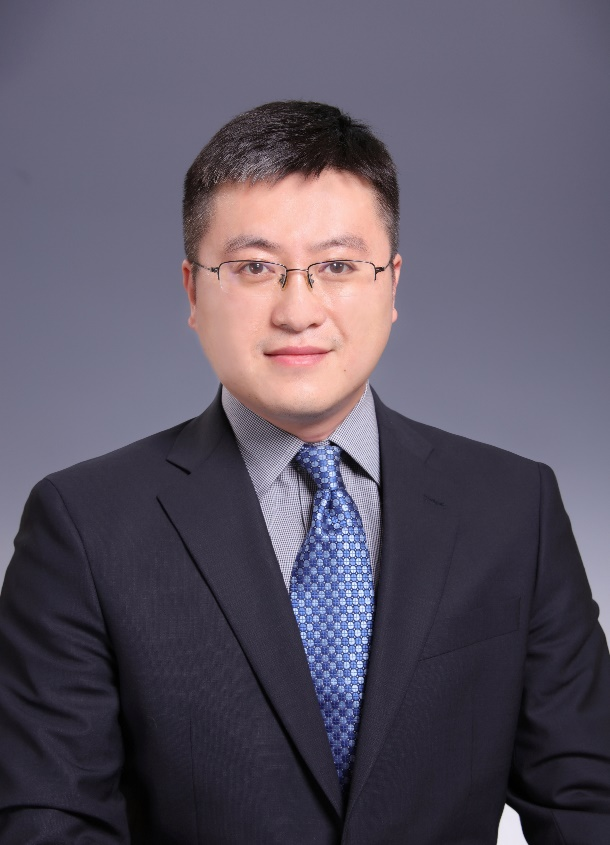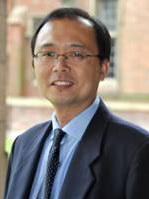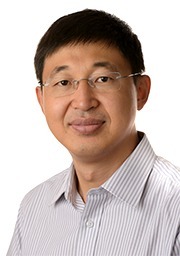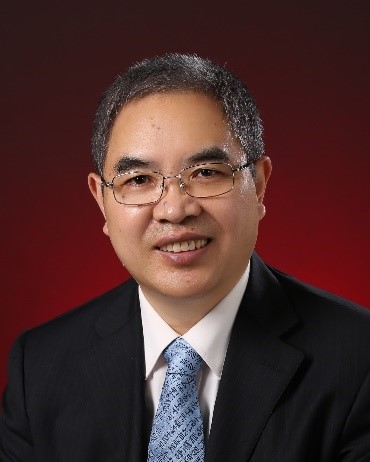
| Prof. Chengxiang Wang, MAE, FRSE, Fellow of the European Academy of Sciences and Arts, IEEE Fellow, IET Fellow, CIC Fellow Southeast University, China Brief Introduction: Cheng-Xiang Wang received the B.Sc. and M.Eng. degrees in communication and information systems from Shandong University, China, in 1997 and 2000, respectively, and the Ph.D. degree in wireless communications from Aalborg University, Denmark, in 2004. He was a Research Assistant with the Hamburg University of Technology, Hamburg, Germany, from 2000 to 2001, a Visiting Researcher with Siemens AG Mobile Phones, Munich, Germany, in 2004, and a Research Fellow with the University of Agder, Grimstad, Norway, from 2001 to 2005. He was with Heriot-Watt University, Edinburgh, U.K., from 2005 to 2018, where he was promoted to a professor in 2011. He has been with Southeast University, Nanjing, China, as a professor since 2018, and he is now the Executive Dean of the School of Information Science and Engineering. He is also a professor with Pervasive Communication Research Center, Purple Mountain Laboratories, Nanjing, China. He has authored 4 books, 3 book chapters, and over 620 papers in refereed journals and conference proceedings, including 28 highly cited papers. He has also delivered 32 invited keynote speeches/talks and 21 tutorials in international conferences. His current research interests include wireless channel measurements and modeling, 6G wireless communication networks, and electromagnetic information theory. Dr. Wang is a Member of the Academia Europaea (The Academy of Europe), a Member of the European Academy of Sciences and Arts (EASA), a Fellow of the Royal Society of Edinburgh (FRSE), IEEE, and IET, an IEEE Communications Society Distinguished Lecturer in 2019 and 2020, a Highly-Cited Researcher recognized by Clarivate Analytics in 2017-2020. He is currently an Executive Editorial Committee Member of the IEEE TRANSACTIONS ON WIRELESS COMMUNICATIONS. He has served as an Editor for over sixteen international journals, including the IEEE TRANSACTIONS ON WIRELESS COMMUNICATIONS, from 2007 to 2009, the IEEE TRANSACTIONS ON VEHICULAR TECHNOLOGY, from 2011 to 2017, and the IEEE TRANSACTIONS ON COMMUNICATIONS, from 2015 to 2017. He was a Guest Editor of the IEEE JOURNAL ON SELECTED AREAS IN COMMUNICATIONS, the IEEE TRANSACTIONS ON BIG DATA, and the IEEE TRANSACTIONS ON COGNITIVE COMMUNICATIONS AND NETWORKING. He has served as a TPC Chair and General Chair for more than 30 international conferences. He received IEEE Neal Shepherd Memorial Best Propagation Paper Award in 2024. He also received 19 Best Paper Awards from international conferences.
|
| Prof. Feifei Gao, IEEE Fellow Department of Automation, Tsinghua University, ChinaBrief Introduction: Feifei Gao (Fellow, IEEE) received the B.Eng. degree from Xi'an Jiaotong University, Xi'an, China in 2002, the M.Sc. degree from McMaster University, Hamilton, ON, Canada in 2004, and the Ph.D. degree from National University of Singapore, Singapore in 2007. Since 2011, he joined the Department of Automation, Tsinghua University, Beijing, China, where he is currently a tenured full professor. Prof. Gao's research interests include signal processing for communications, array signal processing, convex optimizations, and artificial intelligence assisted communications. He has authored/coauthored more than 200 refereed IEEE journal papers and more than 150 IEEE conference proceeding papers that are cited more than 18000 times in Google Scholar. Prof. Gao has served as an Editor of IEEE Transactions on Wireless Communications, IEEE Journal of Selected Topics in Signal Processing (Lead Guest Editor), IEEE Transactions on Cognitive Communications and Networking, IEEE Signal Processing Letters (Senior Editor), IEEE Communications Letters (Senior Editor), IEEE Wireless Communications Letters, and China Communications. He has also served as the symposium co-chair for 2019 IEEE Conference on Communications (ICC), 2018 IEEE Vehicular Technology Conference Spring (VTC), 2015 IEEE Conference on Communications (ICC), 2014 IEEE Global Communications Conference (GLOBECOM), 2014 IEEE Vehicular Technology Conference Fall (VTC), as well as Technical Committee Members for more than 50 IEEE conferences.
Speech Title:Key Technologies and Prototype Design for Integrated Sensing and Communications System Abstract: In the future, millions of base stations (BSs) and billions of users (UEs) will natively build an integrated sensing and communications (ISAC) system, which can utilize intelligent ubiquitous methods to realize the ultimate goal of sensing, i.e., constructing the global mapping from real physical world to digital twin world, while providing communications services at the same time. For this purpose, we conduct a series of theoretical and technical researches on ISAC, in which we decompose the real physical world into static environment, dynamic targets, and various object materials. The ubiquitous static environment occupies the vast majority of the physical world, for which we design static environment reconstruction (SER) scheme to obtain the layout and point cloud information of static buildings. The dynamic targets floating in static environments create the spatiotemporal transition of the physical world, for which we design comprehensive dynamic target sensing (DTS) scheme to detect, estimate, track, image and recognize the dynamic targets in real-time. The object materials enrich the electromagnetic laws of the physical world, for which we develop object material recognition (OMR) scheme to estimate the electromagnetic coefficient of the objects. Finally, based on these theoretical researches, we build an ISAC hardware prototype platform working in millimeter wave frequency band, realizing high-precision SER, DTS, and basic OMR, which provides preliminary verification for building the digital twin for communications networks. |
| Prof. Kang Li, Chair of Smart Energy SystemsSchool of Electronic and Electrical Engineering, University of Leeds, UKBrief Introduction: Prof Kang Li holds the Chair of Smart Energy Systems and the Director of the Institute of Communication and Power Networks at School of Electronic and Electrical Engineering, University of Leeds. His recent research interest lies in the development of machine learning and control technologies to support transport decarbonization, funded by over 50 research projects, totaling £20M. He has published over 200 papers in international journals, winning 20 prizes and awards, and has been invited to give over 100 keynotes and invited talks worldwide. Speech Title: Machine Learning in Green Transportation – Some Case Studeis Abstract: The transport decarbonization increases the coupling of the transport and energy systems, demanding a holistic and data-driven approach to manage and operate the systems with increased complexity. This talk presents several case studies in the application of machine learning techniques in holograph based state estimation and management of electric vehicles in complex urban traffic environments. |
| Prof. Yonghui Li, ARC Future Fellow, IEEE Fellow China School of Electrical and Information Engineering, University of Sydney, SydneyBrief Introduction: Yonghui Li is now a Professor and Director of Wireless Engineering Laboratory in School of Electrical and Information Engineering, University of Sydney. He is the recipient of the Australian Research Council (ARC)Queen Elizabeth II Fellowship in 2008 and ARC Future Fellowship in 2012. He is an IEEE Fellow and Clarivate Highly cited researcher. His current research interests are in the area of wireless communications. Professor Li was an editor for IEEE transactions on communications, IEEE transactions on vehicular technology and guest editors for several special issues of IEEE journals, such as IEEE JSAC, IEEE IoT Journals, IEEE Communications Magazine. He received the best paper awards from several conferences. He has published one book, more than 300 papers in premier IEEE journals and more than 200 papers in premier IEEE conferences. His publications have been cited more than 25000 times. Speech Title:Beyond 5G towards a Super-connected World Abstract: Connected smart objects, platforms and environments have been identified as the next big technology development, enabling significant society changes and economic growth. The entire physical world will be connected to the Internet, referred to as Internet of Things (IoT). The intelligent IoT network for automatic interaction and processing between objects and environments will become an inherent part of areas such as electricity, transportation, industrial control, utilities management, healthcare, water resources management and mining. Wireless networks are one of the key enabling technologies of the IoT. They are likely to be universally used for last mile connectivity due to their flexibility, scalability and cost effectiveness. The attributes and traffic models of IoT networks are essentially different from those of conventional communication systems, which are designed to transmit voice, data and multimedia. IoT access networks face many unique challenges that cannot be addressed by existing network protocols; these include support for a truly massive number of devices, the transmission of huge volumes of data burst in large-scale networks over limited bandwidth, and the ability to accommodate diverse traffic patterns and quality of service (QoS) requirements. Some IoT applications have much stringent latency and reliability requirements which cannot be accommodated by existing wireless networks. Addressing these challenges requires the development of new wireless access technologies, underlying network protocols, signal processing techniques and security protocols. In this talk, I will present the IoT network development, architecture, key challenges, requirements, potential solutions and recent research progress in this area, particularly in 5G and beyond 5G. |
| Prof. Pingyi Fan, IET FellowTsinghua University, ChinaBrief Introduction: Dr. Pingyi Fan is a professor and the director of open source data recognition innovation center, Department of Electronic Engineering, Tsinghua University. He is member (Academician) of the united states national academy of artificial intelligence (NAAI) and Fellow of IET and IET Fellowship international Assessor. He received Ph.D. degree at the Department of Electronic Engineering of Tsinghua University in 1994. From 1997 to 1999, he visited the Hong Kong University of Science and Technology and the University of Delaware in the United States. He also visited many universities and research institutes in the United States, Europe, Japan, Hong Kong and Singapore. He has obtained many research grants, including national 973 Project, 863 Project, mobile special project and the key R&D program, national natural funds and international cooperation projects. He has published more than 600 papers (ORCID) including 171 IEEE journals and more than 10 ESI highly cited papers as well as 4 academic books. He also applied for more than 40 national invention patents, 7 international patents. He won 10 best paper awards of IEEE international conferences, including IEEE ICCCS2023 and 2024, ICC2020 and Globecom 2014, and received the best paper award of IEEE TAOS Technical Committee in 2020, the excellent editor award of IEEE TWC (2009), the most popular scholar award 2023 of AEIC, the second natural Prize of CIC (2023) and several international innovation exhibition medals, i.e. Gold Medal at the Russian Invention Exhibition-2024, Silver Medal at Geneva Invention Exhibition-2023, and Silver Medal at Paris Invention Exhibition-2023 etc. and served as the editorial board member of several Journals, including IEEE and MDPI. He is currently an Associate Editor of IEEE Transactions on Cognitive Communications and Networking (TCCN), the editorial board member of Open Journal of Mathematical Sciences and IAES international journal of artificial intelligence, the deputy director of China Information Theory society, the Co-chair of China's 6G-ANA TG4, and the chairman of Network and Communication Technology Committee of IEEE ChinaSIP. His current research interests are in 6G wireless communication network and machine learning, semantic information theory and generalized information theory, big data processing theory, intelligent network and system detection, etc. Speech Title: How information theory shapes the theory and practice of artificial intelligence Abstract: The report mainly discusses the applications and challenges of information theory in the developments of Artificial Intelligence and Machine Learning, covering its application in generative models, reinforcement learning, distributed federated learning etc. and the AI implementations in autonomous driving, semantic communication and other scenarios. At the same time, the challenges of AI interpretability, model design, and coordination with humans are considered, and the future research directions of the combination of information theory and AI is prospected. |




